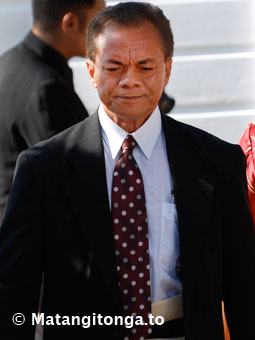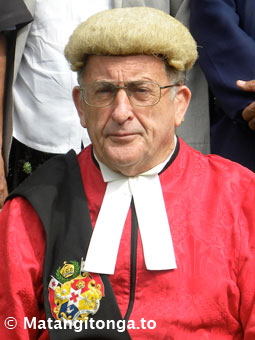
In a strong statement accusing the Tonga Government of attempting to influence the Judiciary, the President of Tonga's Law Society, Laki Niu, yesterday afternoon called a move to set up a new Royal Commission of Inquiry into the matter a "farce".
"The judiciary is no longer independent in Tonga," he stated.
He was responding to an announcement by the Prime Minister's Office on August 5 that the Privy Council had approved the establishment of a "Royal Commission of Inquiry into reports that Government has attempted unduly to influence the independence of the judiciary".
The clash comes on the eve of the departure of Tonga's award-winning Chief Justice Anthony Ford on Friday 13 August, after his contract renewal recommendation by a former Judicial Services Commission was declined by an unexplained Cabinet decision in December last year.
Yesterday Laki Niu expressed his "serious concern" about the approval by Privy Council to set up the Royal Commission. "It does not take much imagination to see that the Royal Commission of Inquiry which has just been approved by Government will find that Government has not attempted unduly to influence the judiciary. Why else was it appointed?"
Government
But in its media statement on August 5 the Prime Minister's Office stated that the government wanted to reassert that it "would not tolerate any interference with the judiciary."
"Allegations of Government interference with the Judiciary surfaced during the former Attorney General's resignation in April and re-surfaced with the recent repeal of the Judicial Services Commission Act and the establishment of the Office of the Lord Chancellor. As the recruitment process for some judicial posts are in progress, the Privy Council considered it important that the Royal Commission's work be undertaken immediately," the PMO statement said.
Concern
However, Laki Niu disagrees. "We do not need an expert, let alone a competent Royal Commission of Inquiry, to say that what the Government has done," he stated. "Or as to why Mr John Cauchi the Attoney General resigned, and as to why the contracts of Justice Andrew and of the Chief Justice Ford have not been renewed despite the recommendations of the Judicial Services Commission last year to renew them, were and are attempts by Government to influence the Judiciary."
Laki believed that by not renewing a judge's contract government would be showing other judges that their own contracts my not be renewed or extended if Government so wished. "Those judges may then have to decide cases as Government wants them decided and injustices would be the result," he stated.
Overturned Judicial Services Act
Laki based his concern on the fact that government had succeeded in overturning the short lived Judicial Services Commission Act of 2006, which he stated had previously "guaranteed total independence of the judiciary and the ability of everyone, including Government to obtain justice in the courts."
He said the Judicial Services Commission Act was enacted to prevent any improper attempt of Government to influence the judiciary. The Act had established a Commission, which comprised the Chief Justice as Chairman and three members who were the Secretary for Justice, the Solicitor General and the President of the Law Society, and it was given the authority to make recommendations to the Privy Council for the appointment (and re-appointment) of judges.
"The Act achieved in the circumstances the independence of the judiciary for the Kingdom. It was a historical milestone in the development not only of the judiciary but also of the Kingdom as a whole. [But] That, however, and most unfortunately, was not to be."
Laki stated that in July this year Government submitted a bill to Parliament and repealed the Judicial Services Act and in its place appointed a Lord Chancellor to carry out the functions.
Laki claimed that Government did that because it wanted to control those recommendations for judges "and it can now do that by controlling the appointment and dismissal of the Lord Chancellor."
Petition to the King
In February 2010 the Law Society petitioned the King and Privy Council to renew the Chief Justice's contract.
"To date despite the repeated inquiries of the Law Society, no reply has been received up to now," Laki stated yesterday.
The letter of petition was the first time the conservative Law Society had written to the King and they noted the great improvements that had been made in the administration of Tonga's Courts under Chief Justice Ford. They believed that under the Constitution that a judge's contract should be renewed unless a requirement of good behaviour had been transgressed and they were concerned that the recommendation for renewal was not accepted by Cabinet.
In their petition they stated that the core of their concern was that, "no party has been able to demonstrate how the Chief Justice has transgressed the constitutional requirement of good behaviour. Given the serious and constitutional nature of our concern the Society would be most grateful if those who adjudicated this transgression could be asked to explain its precise nature to us."
Chief Justice Ford
Meanwhile, Chief Justice Ford will leave Tonga for New Zealand to take up his new position as an Employment Judge in September.

In a recent tribute, a judge of the Federal Court of Australia Mr Justice Moore said that they had worked together at least for the last five years on various programs of reforms, which Chief Justice Ford had enthusiastically embraced. "In that perspective, as a judge in Australia and my own personal perspective as a judge sitting in the Court of Appeal in Tonga, you are now loosing an outstanding Chief Justice," he said.
While serving in Tonga, Chief Justice Anthony Ford received the World Bank Reformer of Year Award 2007, the first time the award has been granted to a court anywhere in the world. The Supreme Court of Tonga won the top award by striking out close to 100 percent of dormant or inactive cases, placing others on a strict timetable, introducing mediation, and increasing the jurisdiction of the Magistrate's Court, and all this was achieved in just more than a year. The implementation of the reforms came at a time when the Tonga courts had never been busier, when Tonga had approximately 500 extra criminal cases arising out of the riots of November 16, 2006.



